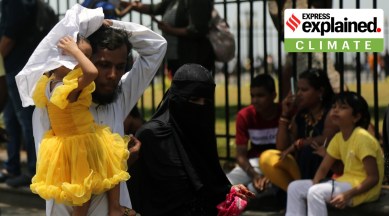In Maharashtra heatstroke deaths, the critical factor of humidity
This year, heatwave conditions developed even in February, an unprecedented occurrence. After a relatively cool March, the summer is expected to be extremely hot, and several parts of the country are likely to experience multiple spells of heatwaves.

Thirteen people died from an apparent heatstroke while attending a government award function in an open space in Navi Mumbai Sunday. This is possibly the biggest-ever heatwave-related death toll from a single event in the country, and brings back the spotlight on potential risks from heatwaves, whose intensity and frequency is expected to rise because of climate change.
Notably, Mumbai, where the deaths took place on Sunday, is not even facing heatwave conditions at present. According to India Meteorological Department (IMD), heatwave conditions are currently prevailing in some areas of Gangetic West Bengal, coastal Andhra Pradesh, and Bihar. In most parts of Mumbai, maximum temperatures on Sunday were in the range of 30-35 degrees Celsius, and conditions are expected to remain this way for the next few days.
Humidity crucial
However, high temperature in itself is not fatal. The combination of high temperature and high humidity, referred to as the wet bulb temperature, is what makes heatwaves deadly. High moisture content in the atmosphere makes it difficult for the sweat to evaporate and bodies to cool down, as a result of which the internal body temperature increases sharply, and is often fatal.
Though the humidity levels at the venue are not clearly known, Anup Kumar Srivastava, a former senior consultant with the National Disaster Management Authority, said there could be several reasons for this unusually high death toll from the event, attended by thousands of people.
“It is possible that many people travelled large distances to come to this event and were exhausted. That makes people more vulnerable to heat strokes. Residents of generally cooler places, like coastal areas, are particularly susceptible to prolonged exposure to heat. People with underlying health conditions are also a high-risk group,” said Srivastava, who has worked on devising and monitoring heat action plans in states and districts for several years.
“Also, in such a large gathering, it is difficult to ensure that everyone has immediate access to drinking water or oral rehydration solutions (ORS). These can be lifesavers in such situations. We do not know how quickly the people received medical attention. Timely medical intervention is extremely important,” he said.
Advisory for political gatherings
Prodded by the NDMA, the Election Commission had, just ahead of the general elections in 2019, circulated a detailed advisory on precautions to be taken to conduct the polls in heatwave-like conditions. Electoral officers were advised to ensure that every polling booth had provisions for drinking water, functional clean toilets, facilities for people to sit, some areas under shade, and essential medical kits.
There are advisories for political parties organising political events or campaign rallies during the election season. Parties are supposed to ensure that water, ORS packets, medical kits, and mobile ambulances are readily available at all such events. These advisories are relevant for Karnataka, which is in the midst of an election campaign. There are no immediate forecasts of heatwave-like conditions in Karnataka right now, but the state is not immune from heatwaves.
Sharp decline in heat-related deaths
Monitoring and management of heatwaves has undergone a big improvement in the past few years and that has resulted in a sharp decline in deaths caused by heatwaves. Almost every vulnerable state now has a heat action plan in place, consisting mainly of early warning, provision of water and ORS at public places, and flexible working hours in offices and education institutions. Special arrangements are made for people working outdoors.
In the 10 years between 2010 and 2020, reported heatwave-related deaths in India came down by more than 90 per cent. Heatwave fatalities had peaked in 2015, when more than 2,000 deaths were reported. This was the time when states and district administrations started implementing heat action plans. The death count dropped rapidly in the next few years, and in 2020 and 2021, only four heatwave deaths were reported, according to government figures.
Last year, however, 33 deaths were recorded. Officials say the increase in heatwave-related deaths could also be because of improved monitoring and reporting of incidents.
But there is no parallel to the Navi Mumbai incident. In June of 2019, more than 100 heatwave-related deaths were reported from three districts of Bihar alone. Unlike the fatalities in Mumbai on Sunday, these deaths did not come from a single event and were spread over a week.
More intense heatwaves
The summer this year is predicted to be excessively hot because of the end of the strong La Nina phase in equatorial Pacific Ocean, something that has a general cooling effect on the earth’s atmosphere. New forecasts suggest that El Nino, which has the opposite impacts of La Nina, is expected to kick in from the May-July period itself, earlier than expected. El Nino also tends to result in suppression of monsoon rainfall over India. A shortfall in rains is already being apprehended, which could exacerbate the effects of a hot summer, even though the India Meteorological Department has predicted a normal monsoon.
Over a longer term, heatwaves are predicted to become more intense, prolonged and frequent because of climate change. Srivastava said the Mumbai incident should be a wake-up call for the authorities.
“Heat related deaths can be prevented easily. Relatively simple measures like access to water, ORS, and shade can prevent hundreds of deaths. But these do not happen on their own. The local administration needs to be vigilant and pro-active. And the implementation needs to be monitored by higher authorities on a daily basis. Karnataka elections can be a good test of our strategy. We were winning this battle just a couple of years ago. There is no reason why we should slide back,” Srivastava said.